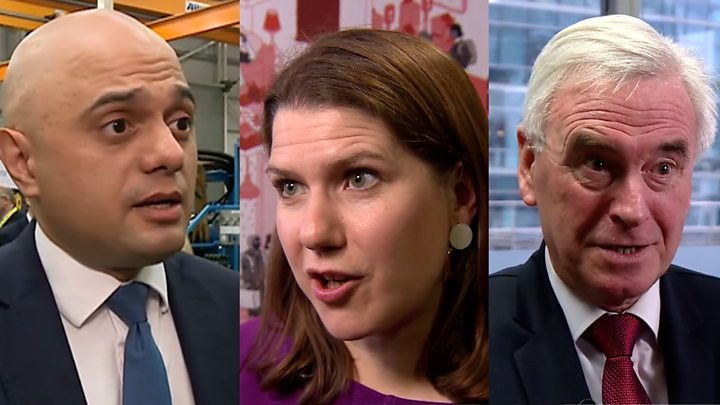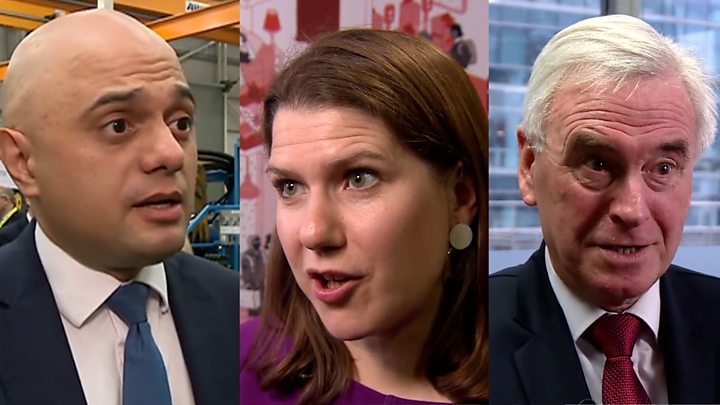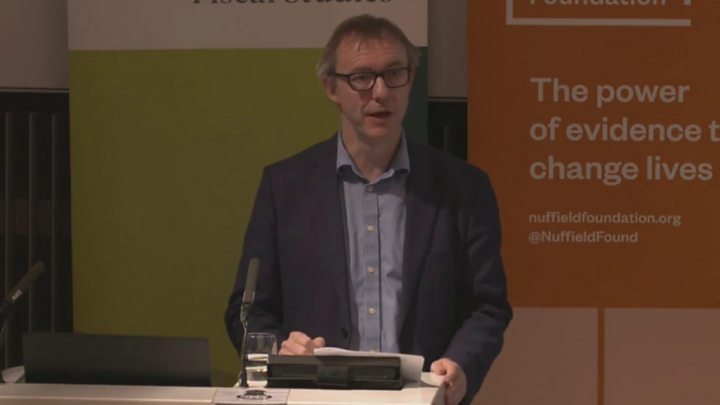General election 2019: Tory and Labour spending plans ‘not credible’ – IFS
Both main parties are not being honest ahead of the general election, an influential research group says. …


Media playback is unsupported on your device
Neither the Conservatives nor Labour are offering “credible” spending plans ahead of the general election, an influential research group has said.
The Institute for Fiscal Studies (IFS) said it was “highly likely” the Tories would end up spending more than their manifesto pledges.
Labour, it warned, would be unable to deliver its spending increases as it has promised.
Neither party was being “honest” with voters, IFS director Paul Johnson said.
The Liberal Democrats’ manifesto, he said, would involve lower levels of borrowing than under Labour or the Conservatives, but would still be seen as “radical” in “most periods”.
However, he added that, given the uncertainty around Brexit, it was difficult to determine what the exact effects of the three parties’ offers would be.
Labour, the Conservatives and the Lib Dems have all published their manifestos, including spending and taxation plans, ahead of the 12 December general election.
Labour is promising to renationalise rail, mail, water and energy, as well as give a 5% pay increase to public sector workers in its first year in government, if elected.
The Lib Dems say stopping Brexit would deliver an extra £10bn a year for public services – they also want to increase all income tax rates by 1% to fund more NHS spending.
The Conservatives have pledged to postpone a scheduled corporation tax cut – from 19% to 17% – to increase spending on public services.

Media playback is unsupported on your device
Paul Johnson said that, under Tory plans, spending on public services apart from healthcare would still be 14% lower by 2023/24 than it was in 2010/11.
Despite this, he said the Conservatives were continuing to “pretend that tax rises will never be needed to secure decent public services” – and said a pledge from the party not to raise income tax, national insurance or VAT over the next five years was “ill-advised”.
“It is highly likely that the Conservatives would end up spending more than their manifesto implies, and thus taxing or borrowing more,” he added.
Labour pledge criticised
Mr Johnson also said it was “highly likely” Labour would need to raise taxes beyond what it is promising to pay for its proposed £80bn a year in extra spending.
He said it was “clearly not the case” the party’s plans would see taxes rise for only the richest 5% of taxpayers.
The IFS said Labour plans to scrap a tax break for married couples and change taxes on company dividends would affect people outside this earnings bracket.
It also argued the party’s planned rise in corporation tax would be passed on to workers in the form of lower wages, and to consumers in the form of higher prices.
“In reality, a change in the scale and the scope of the state that they propose would require more broad-based tax increases at some point,” Mr Johnson added.
It’s a plague on all your houses – but for very different reasons.
The main criticism of Labour is that its spending on investment is just so big, it wouldn’t be able to deliver it.
The IFS also says it is highly likely the party’s tax rises would impact, directly or indirectly, on more than just the top 5% of earners.
There’s no respite for the Conservatives though – particularly on their pledge not to extend the transition period included in the PM’s Brexit deal beyond 2020, even if a trade deal has not been agreed.
The idea that the UK might have to trade on World Trade Organisation terms is seen by these economists as something which would be highly damaging to the economy.
It says this could cause an increase in the deficit of the same order, potentially even higher, than would be caused by Labour’s tax and spending plans.
Paul Johnson also said a Labour manifesto pledge to abolish poverty for people in work over the next five years was “not achievable”, and a plan to scrap the universal credit benefits payment scheme would be “expensive, disruptive and unnecessary”.
He criticised the party’s promise to pay compensation to more than three million women affected by an accelerated rise in the state pension age.
Mr Johnson said there may be scope for “much more limited compensation”, but the group was “relatively well off on average”.
He also criticised the Tories for failing to “come up with any kind of plan or any kind of money for social care”.
A promise that nobody would have to sell their house to pay for care “would appear to be little more than an uncosted aspiration”, he added.
How have the parties responded?
Labour leader Jeremy Corbyn said his party’s manifesto was “bold”, “ambitious”, “prepared for” and had been fully costed.
He said he was “very confident” it would improve the “lifestyle and life chances” of the poorest people in the UK.
Conservative leader Boris Johnson said his party’s manifesto had made “very substantial commitments,” but also insisted it was “fully costed”.
He added that Labour’s spending plans followed an “out-and-out socialist approach” that would “push up taxes massively”.
Lib Dem deputy leader Sir Ed Davey said the IFS assessment “shows that neither the Tories or Labour have a credible plan for the economy”.
“Both are failing to come clean with the electorate and ignoring the Brexit black hole their plans would leave in the public finances,” he added.
Do you have any questions about the forthcoming election?
In some cases your question will be published, displaying your name, age and location as you provide it, unless you state otherwise. Your contact details will never be published. Please ensure you have read the terms and conditions.
Use this form to ask your question:
If you are reading this page and can’t see the form you will need to visit the mobile version of the BBC website to submit your question or send them via email to YourQuestions@bbc.co.uk. Please include your name, age and location with any question you send in.



